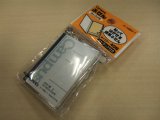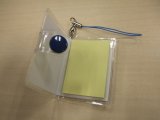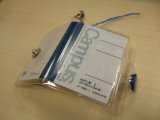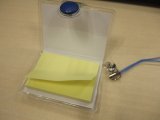たつをの ChangeLog : 2006-08-07
週末は帰省していました。
土曜は夕方からバーベキュー、日曜は昼からパエリア。
食べすぎ、飲みすぎ、です。
しばらく少食路線で行きます…。
写真はパエリア、川魚、恒例のダッチオーブンパン(ref. [2005-05-05-2])。




土曜は夕方からバーベキュー、日曜は昼からパエリア。
食べすぎ、飲みすぎ、です。
しばらく少食路線で行きます…。
写真はパエリア、川魚、恒例のダッチオーブンパン(ref. [2005-05-05-2])。




この記事に言及しているこのブログ内の記事
Web2.0超入門講座
2006-08-07-2
[BookReview]
■小林 祐一郎 / Web2.0超入門講座
--初心者でもよくわかる「これからのWeb」のすべて

INTERNET Watch に2006年1〜5月に連載されたものがベースの本。
かなり分かりやすいです。まんべんなく押さえてあります。
確かに初心者によいかも。
著者のブログ→ Heartlogic http://www.heartlogic.jp/
以下、キーワードだけメモ(自分用):
★第1章 今、Webに起きている変化-ホームページは「壁新聞」じゃなくなった
Webがプラットフォーム / 参加型アーキテクチャ / 大量データ+検索 /
素人情報発信 / ネットワーク効果 / ベータ版サービス増加
★第2章 見えてきたWebの本質-スケールフリー・ネットワーク
ネットワーク分析 / ハブ / スケールフリー・ネットワーク /
「新ネットワーク思考」 / ソーシャルブックマーク / ページランク /
キーワード連動型広告 / アフィリエイト / API
★第3章 「Web2.0とは何か」を読み解くその1-「7つの原則」に込められた意味
集合知 / amazonのカスタマーレビュー / BLOGRANGER / @cosme /
はてなブックマーク / Ajax
★第4章 「Web2.0とは何か」を読み解くその2-Web2.0を理解する、
たった2つのポイント
ロングテール / ベキ法則 / CGM / Alexa
★第5章 ロングテールを利用するWebサービスとビジネスの仕組み-
ロングテールの作り方、儲け方
ネタフル(http://netafull.net/media/014803.html) /
80対20の法則(パレートの法則) / AdWords / SEO / 口コミマーケティング
★第6章 ブログは「ネットワーク構築装置」-日記だけのツールじゃない、
ブログの真価
ブログ / CMS / Wiki / RSSフィード / Web検索とブログ検索 /
テクノラティ / RSSリーダー / フィルタリング / トラックバック /
パーマリンク / アップデートping
★第7章 「Web2.0」を実感するために、経験すべき10のこと-頭だけでなく、
肌感覚としてWebを理解する
(1)オンラインショップで買物をする
(2)RSSリーダーでブログを読む
(3)Ajaxを利用したWebサービスを体験する
(4)Podcastingの番組を聴いてみる
(5)「口コミ」情報を探してみる
(6)家に帰ったらパソコンとテレビをつけて、パソコンの前に座って
寝るまで過ごす
(7)Q&Aサイトで質問してみる
(8)試験的サービスを利用してみて、開発者に意見や要望を出してみる
(9)「情報の共有」を経験する
(10)ブログを書く、読む、コミュニケーションする
★第8章 Webの中で「うまくやる」という考え方-
「ネットワークの中にいる自分」を意識する
ネットワーク内での関係性の変化 / 著作権 / 知の運用
★第9章 Web2.0時代の情報との付き合い方-
量・質・流通スピードが変化する中で、いかに情報と向き合っていくか
アテンション・マネジメント / アテンション・エコノミー /
まとめサイトの重要性 / サイバーカスケードの危険性 / 情報リテラシー
--初心者でもよくわかる「これからのWeb」のすべて

INTERNET Watch に2006年1〜5月に連載されたものがベースの本。
かなり分かりやすいです。まんべんなく押さえてあります。
確かに初心者によいかも。
著者のブログ→ Heartlogic http://www.heartlogic.jp/
以下、キーワードだけメモ(自分用):
★第1章 今、Webに起きている変化-ホームページは「壁新聞」じゃなくなった
Webがプラットフォーム / 参加型アーキテクチャ / 大量データ+検索 /
素人情報発信 / ネットワーク効果 / ベータ版サービス増加
★第2章 見えてきたWebの本質-スケールフリー・ネットワーク
ネットワーク分析 / ハブ / スケールフリー・ネットワーク /
「新ネットワーク思考」 / ソーシャルブックマーク / ページランク /
キーワード連動型広告 / アフィリエイト / API
★第3章 「Web2.0とは何か」を読み解くその1-「7つの原則」に込められた意味
集合知 / amazonのカスタマーレビュー / BLOGRANGER / @cosme /
はてなブックマーク / Ajax
★第4章 「Web2.0とは何か」を読み解くその2-Web2.0を理解する、
たった2つのポイント
ロングテール / ベキ法則 / CGM / Alexa
★第5章 ロングテールを利用するWebサービスとビジネスの仕組み-
ロングテールの作り方、儲け方
ネタフル(http://netafull.net/media/014803.html) /
80対20の法則(パレートの法則) / AdWords / SEO / 口コミマーケティング
★第6章 ブログは「ネットワーク構築装置」-日記だけのツールじゃない、
ブログの真価
ブログ / CMS / Wiki / RSSフィード / Web検索とブログ検索 /
テクノラティ / RSSリーダー / フィルタリング / トラックバック /
パーマリンク / アップデートping
★第7章 「Web2.0」を実感するために、経験すべき10のこと-頭だけでなく、
肌感覚としてWebを理解する
(1)オンラインショップで買物をする
(2)RSSリーダーでブログを読む
(3)Ajaxを利用したWebサービスを体験する
(4)Podcastingの番組を聴いてみる
(5)「口コミ」情報を探してみる
(6)家に帰ったらパソコンとテレビをつけて、パソコンの前に座って
寝るまで過ごす
(7)Q&Aサイトで質問してみる
(8)試験的サービスを利用してみて、開発者に意見や要望を出してみる
(9)「情報の共有」を経験する
(10)ブログを書く、読む、コミュニケーションする
★第8章 Webの中で「うまくやる」という考え方-
「ネットワークの中にいる自分」を意識する
ネットワーク内での関係性の変化 / 著作権 / 知の運用
★第9章 Web2.0時代の情報との付き合い方-
量・質・流通スピードが変化する中で、いかに情報と向き合っていくか
アテンション・マネジメント / アテンション・エコノミー /
まとめサイトの重要性 / サイバーカスケードの危険性 / 情報リテラシー
この記事に言及しているこのブログ内の記事
「シリコンバレー精神」は8/10発売
2006-08-07-3
[Book]
この記事に言及しているこのブログ内の記事
「コクヨノート」のLifeHacks付箋ケース
2006-08-07-4
[Stationery][LifeHacks]
表紙が「コクヨのノート」の付箋ケースです。
32x46mm でケータイストラップ付き。
某YK氏から頂きました。ありがとうございます。
「おーいお茶」のは縦長でしたが、これはノートっぽい縦横比。
(ref. [を] 「おーいお茶」のLifeHacks付箋ケース[2006-07-22-3])




追記060808: Biz.IDで紹介されてました。
- ITmedia Biz.ID:キャンパスノート、開くと付せん コクヨがミニ文具
http://www.itmedia.co.jp/bizid/articles/0607/14/news106.html
32x46mm でケータイストラップ付き。
某YK氏から頂きました。ありがとうございます。
「おーいお茶」のは縦長でしたが、これはノートっぽい縦横比。
(ref. [を] 「おーいお茶」のLifeHacks付箋ケース[2006-07-22-3])




追記060808: Biz.IDで紹介されてました。
- ITmedia Biz.ID:キャンパスノート、開くと付せん コクヨがミニ文具
http://www.itmedia.co.jp/bizid/articles/0607/14/news106.html
この記事に言及しているこのブログ内の記事
Perlでカタカナひらがな変換
2006-08-07-5
[Programming]
Perlでカタカナひらがな変換をやろうと思ったら、
Unicode::Japanese を使うのが手軽なのかな。
- 山科 氷魚 / Unicode-Japanese - search.cpan.org
http://search.cpan.org/dist/Unicode-Japanese/
とりあえず使うことにしてみた。
以下、適当なサンプルプログラム。
追記060808:
subtechグループ - Bulknews::Subtech - [Perl]
http://subtech.g.hatena.ne.jp/miyagawa/20060808/1154963176
perl v5.8.8 で以下のスクリプトで確認。
ところで、「ヴ」はどうしたものか、と思っていたらこんなコメントが。
http://b.hatena.ne.jp/entry/
http%3a//nais.to/~yto/clog/2006-08-07-5.html
(上だと「?」になっちゃってます)。
Unicode::Japanese でも扱ってないみたいだし、まあいいか。
手軽な方法があって安心しました。情報ありがとうございました。
ただ、すべての開発環境の emacs で utf-8 が使えるようになっていない
ので、ソースを utf8 化するのはもうちょっと先になりそうです。
最近やっと perl 5.8.x が常用できる環境になったろころで、
utf8 まわりの(バッド)ノウハウはこれから吸収していきます。
Unicode::Japanese を使うのが手軽なのかな。
- 山科 氷魚 / Unicode-Japanese - search.cpan.org
http://search.cpan.org/dist/Unicode-Japanese/
とりあえず使うことにしてみた。
以下、適当なサンプルプログラム。
#!/usr/bin/perl
# 入力はEUC-JPのTSVで住所とその読み仮名(カタカナ)。
# 出力はUTF-8のTSVで住所とその読み仮名(カタカナ+ひらがな)。
use strict;
use warnings;
use Unicode::Japanese;
while(<>) {
chomp;
my @col = split("\t", $_);
my $addr_str = Unicode::Japanese->new($col[0], 'euc-jp')->get;
my $yomi = Unicode::Japanese->new($col[1], 'euc-jp');
my $kata_str = $yomi->get;
my $hira_str = $yomi->kata2hira->get;
print "$addr_str\t$kata_str\t$hira_str\n";
}
追記060808:
subtechグループ - Bulknews::Subtech - [Perl]
http://subtech.g.hatena.ne.jp/miyagawa/20060808/1154963176
Unicode 文字列にして、普通に tr/// でやればいいような。なるなる。
perl v5.8.8 で以下のスクリプトで確認。
#!/usr/bin/perl use strict; use warnings; use utf8; binmode STDOUT => ":utf8";my $str = "ョヮィ・シックス・アパート"; $str =~ tr/ァ-ン/ぁ-ん/; print $str,"\n";
ところで、「ヴ」はどうしたものか、と思っていたらこんなコメントが。
http://b.hatena.ne.jp/entry/
http%3a//nais.to/~yto/clog/2006-08-07-5.html
2006年08月08日 kitsううう、「う゛」が一文字になったやつ(\xE3\x82\x94)が入力できません
use Jcode; use utf8; jcode($str)->tr('ぁ-?', 'ァ-ヴ'); を考えました。
(上だと「?」になっちゃってます)。
Unicode::Japanese でも扱ってないみたいだし、まあいいか。
手軽な方法があって安心しました。情報ありがとうございました。
ただ、すべての開発環境の emacs で utf-8 が使えるようになっていない
ので、ソースを utf8 化するのはもうちょっと先になりそうです。
最近やっと perl 5.8.x が常用できる環境になったろころで、
utf8 まわりの(バッド)ノウハウはこれから吸収していきます。
たつをの ChangeLog
Powered by chalow
